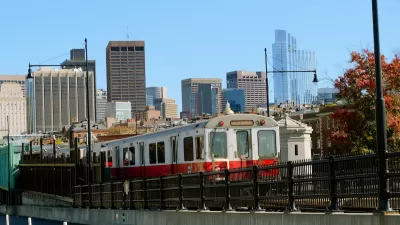Millennials have been clustering in urban hotspots, and millions of others will be settling down over the next decade. William Fulton advises less attractive cities and suburbs on how to avoid a brain drain.
The migration trend of millennials is "to a small number of hip metro areas (D.C., San Francisco, Seattle) and smaller cities (Boulder, Colo.; Missoula, Mont.; Palo Alto, Calif.) around the country and hip employers follow them," writes Fulton. "The result is an upward cycle of talent and jobs and business growth in the fashionable places, and a downward cycle everywhere else."
Even Boston, "which has the greatest concentration of universities in the country, lots of cool neighborhoods and a big chunk of the innovation economy" is facing an outmigration, though the problem there is primarily one of cost, not lack of appeal. Experts say that Boston "needs more starter homes in interesting, transit-rich locations," but this will be an easier feat for Boston than for other less attractive cities and suburbs.
Fulton explains, "So if you're not one of the hip places today, you have only a few years -- the length of one real estate cycle and the time horizon for planning an infrastructure project -- to become hip enough to keep your kids and attract others." He acknowledges that "[t]his might seem like a daunting, if not insurmountable challenge," but he points out that second-tier cities like Omaha, Neb.; Oklahoma City; Richmond, Va.; Syracuse, Buffalo and Rochester, N.Y.; and Manchester, N.H. have been successful.
"Most people -- even millennials -- want to live near their families and near where they grew up," concludes Fulton, "meaning that if you can create interesting places, they're likelier to stay. And you don't need the endless hip urban fabric of New York or D.C. to compete. You just need a few great neighborhoods for people to live and work in. For most cities, that's an achievable goal."
FULL STORY: Do Millennials Want to Call Your City ‘Home’?

Maui's Vacation Rental Debate Turns Ugly
Verbal attacks, misinformation campaigns and fistfights plague a high-stakes debate to convert thousands of vacation rentals into long-term housing.

Planetizen Federal Action Tracker
A weekly monitor of how Trump’s orders and actions are impacting planners and planning in America.

San Francisco Suspends Traffic Calming Amidst Record Deaths
Citing “a challenging fiscal landscape,” the city will cease the program on the heels of 42 traffic deaths, including 24 pedestrians.

Defunct Pittsburgh Power Plant to Become Residential Tower
A decommissioned steam heat plant will be redeveloped into almost 100 affordable housing units.

Trump Prompts Restructuring of Transportation Research Board in “Unprecedented Overreach”
The TRB has eliminated more than half of its committees including those focused on climate, equity, and cities.

Amtrak Rolls Out New Orleans to Alabama “Mardi Gras” Train
The new service will operate morning and evening departures between Mobile and New Orleans.
Urban Design for Planners 1: Software Tools
This six-course series explores essential urban design concepts using open source software and equips planners with the tools they need to participate fully in the urban design process.
Planning for Universal Design
Learn the tools for implementing Universal Design in planning regulations.
Heyer Gruel & Associates PA
JM Goldson LLC
Custer County Colorado
City of Camden Redevelopment Agency
City of Astoria
Transportation Research & Education Center (TREC) at Portland State University
Jefferson Parish Government
Camden Redevelopment Agency
City of Claremont





























